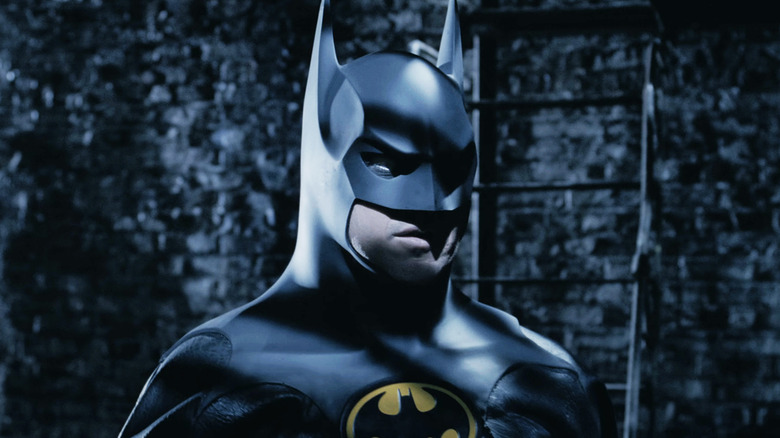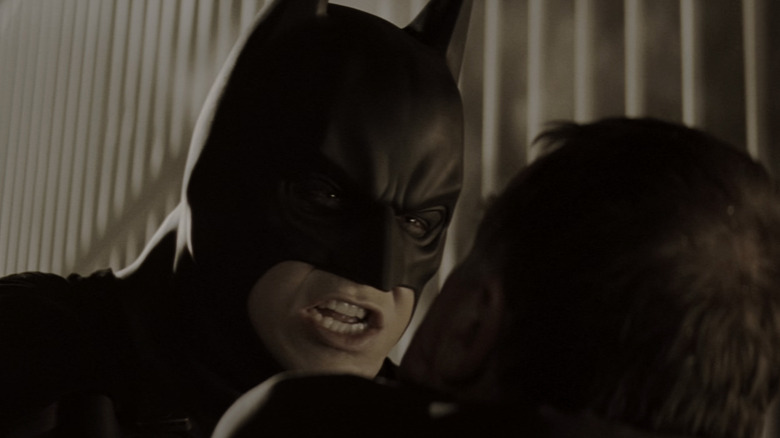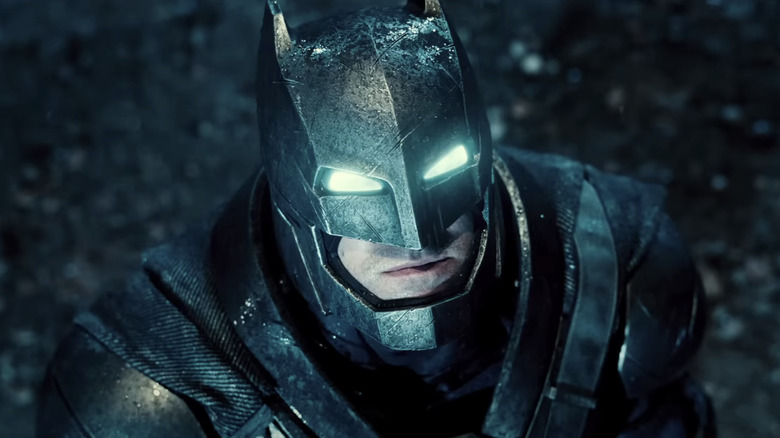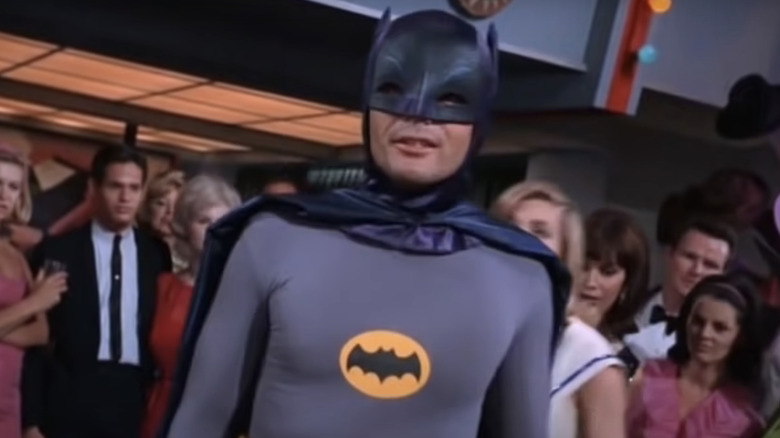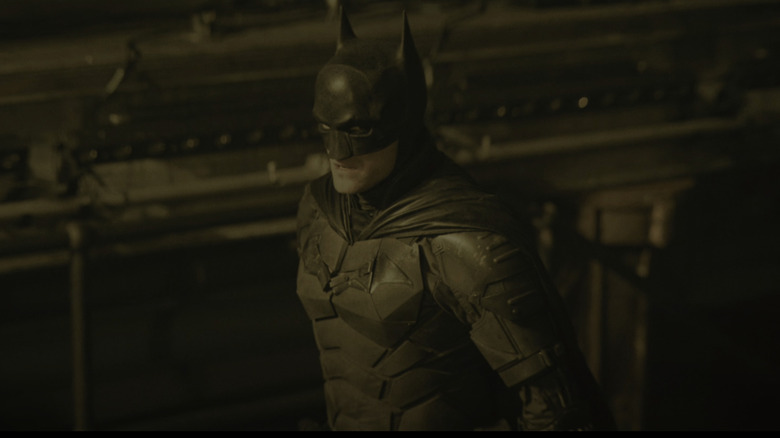The Correct Order To Watch Every Batman Movie
In the last 30-odd years we've had eight live-action films based on the Dark Knight (13 if you include the DCEU movies that featured him as a character) and with Matt Reeves' "The Batman: Part II" and a "Brave and the Bold" movie incoming, we'll soon have more. While some might see this as overkill, most of us have realized that Batman is one of those rare characters whose remarkable staying power has to do with the fact that he lends himself to this kind of constant reinvention. Val Kilmer saw Batman as a blank slate that any actor could play, but he's also a character on which seemingly any comic book artist, writer, or film director could put their spin. The point being that the Dark Knight has been such an enduringly popular character precisely because he means so many different things to so many people, and can be reimagined to seemingly no end.
One by-product of this endless reinvention, however, is that the uninitiated might be a tad confused about where to start with Batman's on-screen legacy. Aside from the fact there have been multiple animated movies, including an array of DCAU films that feature him as part of an ensemble cast of heroes, we've now had four separate directors give us their take on the caped crusader across the eight live-action Batman movies, alongside Zack Snyder's DCEU films featuring Ben Affleck's Dark Knight. So, unless you're a die-hard fan, you've probably lost the thread of how these films are linked, whether they're even linked in the first place, or what the heck anything means in the age of multiverses and shared timelines. Well, allow us to be your guide through the shadowy environs of the Dark Knight's cinematic history.
The correct order to watch the Batman movies
When I was a kid, we had Tim Burton Batman films and that was it. Michael Keaton was the Batman and everything made sense. Now, of course, things have changed dramatically, and we've since seen Joel Schumacher, Christopher Nolan, and Matt Reeves handed the reins to the franchise. As such, things have become a little confusing in terms of timelines. So, to keep things as simple as possible, we'll first focus on the "Batman" franchise proper — not films where he appears as a main character, i.e. the Snyder movies.
With that out the way, you can think of the live-action Batman movies as breaking down into three distinct and totally separate eras: the Burton/Schumacher era, the Nolan era, and the Matt Reeves era. Fortunately, these all follow consecutively with no overlap, which means you can watch the movies in their production order and they'll make sense. Here's the production order list:
The Burton/Schumacher run:
-
"Batman" (1989)
-
"Batman Returns" (1992)
-
"Batman Forever" (1995)
-
"Batman & Robin" (1997)
The Nolan movies:
-
"Batman Begins" (2005)
-
"The Dark Knight" (2008)
-
"The Dark Knight Rises" (2012)
The Reeves-verse:
-
"The Batman" (2022)
The upcoming MAX series, "The Penguin," picks up immediately after the events of "The Batman" and will bridge the gap between Reeves' first film and the upcoming sequel. It's also worth mentioning that you can watch the different "eras" of movies in whatever order you like and they'll still make sense. For instance, you can start with "Batman Begins" and watch through to "The Dark Knight Rises" before going back to check out the '90s movies and, as long as you watch every film in each "era" in order, you won't be confused.
The Snyderverse
Wait! Batfleck is surely just as legitimate a Batman as any other, right? Well, that might be true, but the man never led a "Batman" film per se. The closest he came was 2016's "Batman v Superman: Dawn of Justice," but that can hardly be said to belong to the main Batman franchise. As such, we've separated the DCEU movies out from the pack, but if you simply must watch them as part of your Batman viewing extravaganza, you can easily just slot them into your production order playlist.
That would mean following up Nolan's "The Dark Knight Rises" with "Batman v Superman." After that comes 2016's "Suicide Squad," in which Bats appears in several Harley Quinn flashbacks, followed by Joss Whedon's 2017 effort "Justice League." Zack Snyder then gave us his original vision of that same film with 2021's "Zack Snyder's Justice League," and that pretty much wraps up the DCEU films, which, if you absolutely need to see every live-action incarnation of Batman, should slot nicely between "The Dark Knight Rises" and "The Batman."
But there's still one outlier: the superheroic box office bomb that was 2023's "The Flash." This one's tricky as it draws together threads from the Burton-verse and Snyderverse, which means, if you're watching all these movies in their production order, it's probably best watched as an addendum to "Zack Snyder's Justice League," prior to watching "The Batman."
Here's the bullet point list to make things a little easier
-
"Batman" (1989)
-
"Batman Returns" (1992)
-
"Batman Forever" (1995)
-
"Batman & Robin" (1997)
-
"Batman Begins" (2005)
-
"The Dark Knight" (2008)
-
"The Dark Knight Rises" (2012)
-
"Batman v Superman: Dawn of Justice" (2016)
-
"Suicide Sqaud" (2016)
-
"Justice League" (2017)
-
"Zack Snyder's Justice League" (2021)
-
"The Flash" (2023)
-
"The Batman" (2022)
What about the rest?
That's the main Batman franchise films and the Snyderverse covered, but what about all the other movies featuring the Dark Knight? After all, the Batman movie legacy didn't technically start with Tim Burton's films. In fact, they didn't even start with the 1960s film based on the TV show. No, the first time the caped crusader was given the cinematic treatment was back in 1943, when Columbia released "Batman," a 15-part serial for the theaters with Lewis Wilson in the title role. The studio followed that up in 1949 with yet another 15-part serial entitled, "New Adventures of Batman and Robin, the Boy Wonder." The next time audiences saw Batman on the big screen was in 1966's "Batman: The Movie," a film that's pure joy and which sees Adam West reprise the role he'd become famous for portraying on the TV show from the same decade.
All of which is to say that if you want to be 100 percent accurate about watching every single live-action Batman film in order, then you should technically start with the 1943 serial and go from there. Tubi currently has the movie available in the U.S., but perhaps a quick YouTube search might turn up something of interest ... After that, it's a case of watching things in their production order once again, slipping in "The Flash" ahead of "The Batman."
The best order to watch every Batman movie
With so many choices floating around, it's fair to say that not every Batman movie is made equal. What's more, there are some finer points worth bearing in mind when considering a rewatch/first watch of the Batman films.
Firstly, though the two Joel Schumacher films "Batman Forever" and "Batman & Robin" are technically set in the same universe as the two Tim Burton films, they really only share some tenuous links. For example, the only things linking "Batman Forever" with the previous two entries are some returning cast members (Michael Gough as Alfred and Pat Hingle as Commissioner Gordon) and a line from Val Kilmer's Batman about not having much luck with women — which, at a stretch, could be interpreted as a reference to Bruce's relationship troubles in the Burton movies.
As such, "Batman Forever" and "Batman & Robin" could easily be considered part of a distinct universe, especially since Joe Quinones' comic book "Batman '89" officially split the timeline so that "Batman" and "Batman Returns" belong to an entirely separate world. In that sense, you'd be well within your rights to watch "Forever" and "Batman & Robin" separately from the first two movies if you so wish, or maybe even skip the latter altogether, especially since even star George Clooney basically disowned the film.
So, while the production order is pretty much the best way to watch every Batman film ever made, you can easily drop certain entries and still have the whole thing make sense. In some cases, we'd recommend doing just that by starting with the Burton films, giving "Batman Forever" a go, then moving to Nolan's trilogy and finishing up with "The Batman."
